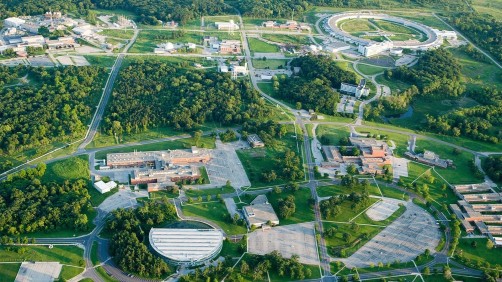Newswise — The U.S. Department of Energy (DOE) recognized scientists from DOE’s Argonne National Laboratory with two of its prestigious Secretary’s Honor Awards in a virtual ceremony on Jan. 24. Energy Secretary Jennifer Granholm, Deputy Secretary David Turk and Under Secretary for Nuclear Security and Administrator of the National Nuclear Security Administration Jill Hruby presented a total of 44 team achievement awards and five individual awards for achievements and milestones reached in 2022.
Nuclear reactor conversion the focus of Argonne team
One of the awards recognized a team of eight from Argonne’s Nuclear Technologies and National Security directorate — John Stevens, Nelson Hanan, Patrick Garner, Jordi Roglans-Ribas, Bonnie Basiorka, Karen Grudzinski, John W. Holland and Caryn Warsaw — for outstanding efforts to convert nuclear research reactors that use highly enriched uranium into reactors that use low-enriched uranium. This step reduces proliferation risk and is key to the peaceful use of reactors.
“This team’s focused expertise ensured successful conversion of multiple research reactors over the past decade.” — Temitope Taiwo, director of Argonne’s Nuclear Science and Engineering division
Notably, the team converted Kazakhstan’s IVG reactor in March 2022 after successfully converting the VVR-K reactor in 2016 and the VVR-K CA reactor in 2013. The conversion process is integral to the National Nuclear Security Administration’s nonproliferation goals.
“This team’s focused expertise ensured successful conversion of multiple research reactors over the past decade,” said Temitope Taiwo, director of Argonne’s Nuclear Science and Engineering division. “Their ongoing commitment is also evidence that the important work of converting remaining research reactors will continue. Argonne is proud of this team and supports their ongoing peaceful efforts.”
Argonne leadership particularly acknowledged experts Hanan, Garner and Roglans-Ribas for tireless commitment and extensive travel to lead and execute projects involving definitively complex conversions of Russian-designed reactors. They also led additional projects in the Czech Republic, Libya, Vietnam, Uzbekistan, Ukraine, Hungary, Kazakhstan, Poland and Russia.
Only two Russian-designed research reactors outside of Russia still use highly enriched uranium, thanks in part to the Argonne team. One of the reactors is in Kazakhstan, the other is in North Korea. The team, led by Hanan and Garner, is scheduled to return to Kazakhstan in early 2023 to continue their work.
Wang honored for helping promote aviation decarbonization
The second award recognized the multiagency, multilaboratory Sustainable Aviation Fuels (SAF) Grand Challenge team, which includes Argonne Distinguished Fellow Michael Wang. The team launched a government-wide initiative to decarbonize the U.S. aviation sector with advanced fuels and gain broad industry support for the initiative. The grand challenge is to make these fuels less expensive and more sustainable as well as expand their production and use.
Wang, interim director of Argonne’s Energy Systems and Infrastructure Analysis division, was “pleased and honored” to be part of the 43-member team, which includes members from DOE’s Bioenergy Technologies Office, the U.S. Department of Agriculture, the Federal Aviation Administration and several national laboratories.
The SAF Grand Challenge team, which was also commended by DOE’s Office of Energy Efficiency and Renewable Energy, rallied support through extensive stakeholder outreach. Stakeholders include the White House Council on Environmental Quality, airlines, airports, aircraft manufacturers, fuel producers and nongovernmental organizations. The team formalized efforts and helped ensure strong support by executing a memorandum of understanding among DOE and the U.S. departments of Transportation and Agriculture.
The team also helped set the first-ever SAF-volume goals of 3 billion gallons per year by 2030, and 35 billion gallons per year by 2050. Furthermore, it secured airline industry support for volume targets. Wang and his colleagues at Argonne applied the laboratory’s Greenhouse gases, Regulated Emissions, and Energy use in Technologies life cycle analysis model to examine the carbon intensities of a variety of SAF production pathways and help identify usage goals.
The DOE also recognized the team’s achievement in developing a SAF Grand Challenge roadmap. This will guide agency efforts moving forward and help working groups evaluate issues such as financing facilities and harmonizing global life cycle assessment modeling. Altogether, the team’s efforts helped establish the U.S. as a leader in creating a SAF industry.
Argonne National Laboratory seeks solutions to pressing national problems in science and technology. The nation’s first national laboratory, Argonne conducts leading-edge basic and applied scientific research in virtually every scientific discipline. Argonne researchers work closely with researchers from hundreds of companies, universities, and federal, state and municipal agencies to help them solve their specific problems, advance America’s scientific leadership and prepare the nation for a better future. With employees from more than 60 nations, Argonne is managed by UChicago Argonne, LLC for the U.S. Department of Energy’s Office of Science.
The U.S. Department of Energy’s Office of Science is the single largest supporter of basic research in the physical sciences in the United States and is working to address some of the most pressing challenges of our time. For more information, visit https://energy.gov/science.

